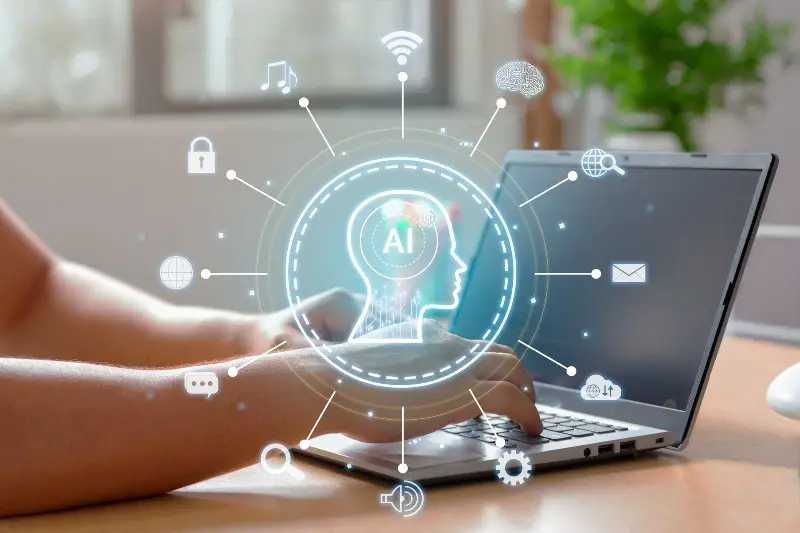Introduction
In a world where digital footprints are becoming increasingly extensive, the importance of cybersecurity can’t be overstated. Cyberattacks can lead to severe consequences, ranging from financial loss to reputation damage. As cyber threats evolve and become more complex, traditional security measures often struggle to keep up. In response, artificial intelligence is stepping up, transforming how we approach cybersecurity. This post aims to explore the nuanced role of AI in cybersecurity, its applications, and its potential to reshape the digital security landscape.
Artificial intelligence in cybersecurity is an intriguing intersection of two complex domains. AI can learn and adapt from data, identifying patterns and making decisions, often more rapidly and accurately than human counterparts. This makes AI a valuable tool in combating cyber threats. But, just as AI can be a powerful defence mechanism, it can also be used maliciously to create sophisticated cyber threats. This dual-edged reality makes the topic of AI in cybersecurity both fascinating and crucial.
Cybersecurity professionals are keen to leverage AI’s potential to enhance threat detection, improve response times, and automate monotonous tasks. Let’s delve into the definitions, current applications, and future implications of AI in the realm of cybersecurity.
How can AI-based tools help improve the quality of telemarketing calls?
The Definition and Role of AI in Cybersecurity
Artificial intelligence, at its core, is a technology that enables machines to mimic human intelligence. In the realm of cybersecurity, AI operates by learning from cybersecurity data, such as past incidents, threat reports, and more, to detect patterns and predict potential threats. It automates routine tasks, frees up time for cybersecurity professionals, and facilitates a proactive approach to security rather than a reactive one.
AI can identify anomalies, monitor systems continuously, and send alerts for potential threats at scale. It’s used for various purposes, such as threat detection, fraud detection, phishing detection, and more. For example, AI-powered cybersecurity solutions like Darktrace use machine learning algorithms to detect anomalies in real-time, enabling rapid response to potential threats.
How Artificial Intelligence is Changing the Landscape of Cybersecurity
AI is fundamentally changing the cybersecurity landscape. One key aspect is the advent of AI-powered threat detection and response systems, which identify potential threats more accurately and respond more swiftly than human-operated systems. Tools like Cynet leverage AI and machine learning to correlate threat indicators from different sources, providing a comprehensive view of the threat landscape.
Another crucial change is in the domain of cybersecurity operations. AI can automate mundane tasks and provide decision-making insights, enhancing efficiency and effectiveness. For instance, IBM’s Watson for Cybersecurity uses natural language processing and machine learning to understand, reason and learn about cybersecurity threats from structured and unstructured data. This not only reduces the workload of cybersecurity professionals but also enhances their decision-making capabilities.
Step into the fascinating world of the present, where artificial intelligence (AI) is not a distant dream, but a thrilling reality. Experience the seamless integration of AI in your everyday gadgets – your smartwatch, the intuitive smart speaker, the diligent security alarm, or the customer service chat box – all are manifestations of the awe-inspiring AI technology. Curious about the behind-the-scenes of AI creation? Pondering if AI is actually real? The enlightening ‘Artificial Intelligence For Dummies’ has all the answers you seek.
Commencing with a fundamental understanding of AI, this reference demystifies the intricate topic of AI for you. From the usage of data, algorithms, to the specialized hardware, the book is an easy-to-understand guide to the universe of AI that breathes life into the devices you simply can’t do without.
Here’s what the book promises to offer:
- Debunk the hyperbole surrounding artificial intelligence and get a true picture
- Delve into the astonishing capabilities of AI and learn about its boundaries
- Learn how AI accelerates data collection and analysis, enabling faster, informed decisions
- Explore how AI breathes life into hardware applications such as drones, robots, and vehicles
- Discover the potential applications of AI in diverse fields like space, medicine, and communication that are on the horizon
It’s worth noting that nearly 80% of the devices you interact with on a daily basis rely on some form of AI. While you don’t need to understand AI to use your smart speaker or engage with a bot, possessing knowledge about its inner workings will undoubtedly make you feel smarter. So, why wait? Grab this accessible guide today and unravel the captivating secrets of AI!
Artificial Intelligence in Cyber Threat Detection and Mitigation
Artificial Intelligence has become an invaluable tool for detecting and mitigating cyber threats. AI systems can sift through large volumes of data to identify potential threats, significantly improving efficiency and accuracy. Machine learning, a subset of AI, is particularly useful for identifying patterns and detecting anomalies that might indicate a cyber threat.
Take, for example, Vectra AI. This cybersecurity platform uses AI to automate the detection of hidden and unknown attackers, expose attacker behaviours, and empower threat hunters to perform conclusive incident investigations. Similarly, Zeguro, a cyber safety solution provider, employs machine learning algorithms to analyze risk data and offer personalized, actionable cybersecurity recommendations.
AI can also help in mitigating threats. After detecting a potential threat, AI systems can isolate affected networks or systems to prevent the spread of malicious activity. This is particularly useful in managing Distributed Denial of Service (DDoS) attacks, where AI systems can help filter out malicious traffic and maintain service continuity.
The Role of AI in Enhancing Digital Security
AI plays a vital role in enhancing digital security, from enabling biometric logins to facilitating continuous network monitoring. Its ability to learn and adapt makes AI a powerful ally in the fight against increasingly sophisticated cyber threats.
In the field of biometrics, AI technologies like facial recognition and fingerprint scanning are improving the security of devices and applications. Companies like Trueface offer AI-powered facial recognition software that can identify and verify individuals with high accuracy, enhancing security in various sectors.
AI is also instrumental in improving network security. Network security systems powered by AI can analyze network traffic, identify patterns, detect anomalies, and respond to threats in real-time. Cisco’s Encrypted Traffic Analytics is a case in point. It uses AI and machine learning to detect malware in encrypted traffic without decryption, providing a safer and more privacy-conscious approach to network security.
A digital Marketing strategy can boost your website traffic. Learn more about Digital Marketing
AI and the Future of Cybersecurity
As cyber threats become more sophisticated, the role of AI in cybersecurity is set to grow. AI offers promising solutions for combating cyber threats, from automating threat detection to facilitating real-time response and recovery.
One potential future application of AI in cybersecurity is autonomous response technology. This involves AI systems not only detecting threats but also taking action to mitigate them without human intervention. While this technology is still in its early stages, companies like Darktrace are already pioneering AI systems capable of fighting back against cyber-attacks in real-time.
AI may also play a role in predicting cyber threats. By analyzing past incidents and current trends, AI could potentially predict the likelihood of specific types of cyber-attacks and provide insights for preventive measures.
However, as AI’s role in cybersecurity expands, ethical and regulatory considerations will become increasingly important. Balancing the benefits of AI with privacy concerns and the potential for misuse will be a key challenge going forward.

Navigating the Convergence: Artificial Intelligence and the Legal Sphere
Artificial Intelligence (AI) has transformed multiple sectors, including the field of law. This blog post delves into the legal aspects of AI, the regulatory landscape, and AI’s role in legal practice. It also explores AI’s impact on privacy law and the ethical quandaries it presents. A comprehensive look at the intriguing intersection of AI and law.
AI and the Future of Cybersecurity
As cyber threats become more sophisticated, the role of AI in cybersecurity is set to grow. AI offers promising solutions for combating cyber threats, from automating threat detection to facilitating real-time response and recovery.
One potential future application of AI in cybersecurity is autonomous response technology. This involves AI systems not only detecting threats but also taking action to mitigate them without human intervention. While this technology is still in its early stages, companies like Darktrace are already pioneering AI systems capable of fighting back against cyber-attacks in real-time.
AI may also play a role in predicting cyber threats. By analyzing past incidents and current trends, AI could potentially predict the likelihood of specific types of cyber-attacks and provide insights for preventive measures.
However, as AI’s role in cybersecurity expands, ethical and regulatory considerations will become increasingly important. Balancing the benefits of AI with privacy concerns and the potential for misuse will be a key challenge going forward.
In conclusion, the application of AI in cybersecurity is revolutionizing the landscape in unprecedented ways. The integration of AI in this field is a testament to the ever-evolving intersection of technology and security. It’s not an overstatement to say that AI has become an indispensable tool for detection, mitigation, and prevention of cyber threats, increasing both the efficiency and effectiveness of cybersecurity measures.
AI’s ability to analyze vast amounts of data and identify patterns is invaluable for detecting and mitigating cyber threats. This has led to the creation of advanced cybersecurity platforms that can detect hidden threats and expose attacker behaviors. Moreover, AI’s role in isolating affected networks or systems after detecting a potential threat has proved particularly useful in managing significant cyber threats like DDoS attacks.
Furthermore, AI’s role in enhancing digital security is multifaceted and far-reaching. From enabling biometric logins to continuous network monitoring, AI continues to prove itself as a powerful ally in securing digital infrastructure. This is evident in the emergence of AI-powered facial recognition software and network security systems that can analyze and respond to threats in real-time.
Looking to the future, the potential applications of AI in cybersecurity are immense. The concept of autonomous response technology, where AI systems can detect and mitigate threats without human intervention, is already being explored. The possibility of AI predicting cyber threats based on past incidents and current trends could revolutionize preventative measures in cybersecurity.
However, with these advancements come new challenges. As AI’s role in cybersecurity expands, so do ethical and regulatory considerations. Ensuring that the benefits of AI are balanced with privacy concerns and the potential for misuse will be a critical issue in the coming years. Thus, while we celebrate the advances AI brings to cybersecurity, we must also be vigilant in addressing the challenges it poses.
Discover the vibrant world of e-Commerce, where endless possibilities and captivating experiences await at the click of a button, revolutionizing the way you shop, connect, and thrive online.





